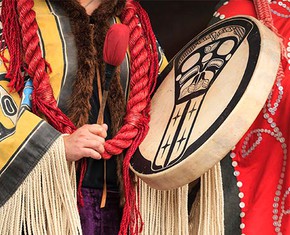The views expressed in our content reflect individual perspectives and do not represent the authoritative views of the Baha'i Faith.
I shocked and amused my high school classmates when I told them, at age 17, that the main sources of information for my new religion were all on the internet.
“The internet? How could you learn about anything on the internet?” someone asked me incredulously. That was in 2002, which really wasn’t that long ago.
For them, religion was something a person absorbed slowly from childhood. Whatever you were raised as was what you were. Changing religion later in life seemed somehow less authentic. That perspective, I tried to explain, was wrong—the truth encountered through religion and spirituality can be arrived at through one’s own conscious exploration:
Furthermore, know ye that God has created in man the power of reason, whereby man is enabled to investigate reality. God has not intended man to imitate blindly his fathers and ancestors. He has endowed him with mind, or the faculty of reasoning, by the exercise of which he is to investigate and discover the truth, and that which he finds real and true he must accept. – Abdu’l-Baha, The Promulgation of Universal Peace. p. 291.
As I made my way through high school, my personal connection with Catholicism had deteriorated and gradually slipped away. Then, by 17, I felt adventurous enough to not only declare what I didn’t believe, but to find something that spoke to my convictions and spiritual hunger. But this being southern Indiana, my options for finding people and speaking to them face to face about different religions and spiritual paths were few and far between. Nonetheless, the internet beckoned, the new gadget that most people at the time just used for looking up movie times and goofy cat pictures.
The path I first discovered was not the Baha’i Faith. That came later. Before I knew the slightest thing about the Baha’i Faith, I found Buddhism.
Until then, I hadn’t learned anything about Buddhism that I didn’t like. Besides a few unsubstantiated rumors that they worshipped golden statues, it seemed like an awesome religion where people meditated a lot and reached higher levels of consciousness. That sounded cool to me. So I kept it in the back of my mind for months that I should seriously investigate it.
Then one evening in October of 2002 I finally did. I found some helpful websites, read intensively, and it was amazing. I studied the Four Noble Truths, the Eight-Fold Path, and concepts like mindfulness, non-selfhood, and dependent arising. After three hours or so I resolved to sit down and meditate. There was no looking back. It was nearly a year before I met another Buddhist, and in that short time, I felt like I learned more about Buddhism over the internet and through daily meditation than I did about Christianity in my thirteen years of attending Catholic schools.
In past centuries, nearly everyone adopted the religion of their parents, their village, and their nation. Sometimes, believers in new and strange teachings would come from afar, and their beliefs and practices would slowly and gradually take root. But for most people, the simplicity of following local and familial tradition represented the only option.
Modern times are different though. Information spreads more easily. The world is more connected. Decades before the emergence of computers and the internet, Abdu’l-Baha wrote about those increasingly close connections:
In this day, however, means of communication have multiplied, and the five continents of the earth have virtually merged into one. And for everyone it is now easy to travel to any land, to associate and exchange views with its peoples, and to become familiar, through publications, with the conditions, the religious beliefs and the thoughts of all men. – Selections from the Writings of Abdu’l-Baha, p. 35.
The Baha’i teachings explain how the unification of humanity under one world civilization can now become attainable. It implies a transformation, not just in the economic and political spheres of life, but also in the realm of culture, the arts, religion, and spirituality. Our ignorance of other paths no longer binds us to the customs of our neighbors and our ancestors. The fusion of the Earth into one global society has opened innumerable doors for the transformation of our inner life.
When I was 18, and I met my first Baha’is, they were the only ones I knew who seemed to appreciate this reality.
I only practiced Buddhism exclusively for about a year. Then, strangely enough, Buddhist meditation taught me how to appreciate Christian spirituality. Meditation cleared away the worthless mental baggage I carried around and provided a fresh approach to understanding the teachings of Jesus. In practice the two paths seemed very compatible. Thirteen years of Catholic schooling gave me a lot. But a living practice of Christian spirituality was one thing it couldn’t do. After a year of daily meditation, I found myself practicing Buddhism and Catholicism simultaneously. Now I was also reciting the Rosary as part of that daily meditative routine.
The Buddhists looked on curiously. The Christians were horrified. The Baha’is really wanted me to come to their study circle.
In their minds, this all made perfect sense. Baha’is understand that the missions of Jesus and the Buddha both arose from a single divine plan for the spiritual education of humanity. So of course the two paths were compatible. I was the seeker in their gatherings who said yes, that’s exactly true.
At first, while I strongly disagreed with them on many points, especially on the historical and spiritual significance of Baha’u’llah, I shared their pluralistic vision of spirituality, which still left room for a supreme being at the root of the world’s religions. I became close friends with the Baha’is at my school. Through innumerable conversations, we deeply acquainted each other with our ideas, beliefs, and aspirations.
Eventually I did come to embrace the Baha’i Faith and all its teachings regarding the person of Baha’u’llah. It came about through reading a book a friend lent to me. Unlike before, when I committed myself to Buddhism, this time I had deep personal connections to Baha’is. It wasn’t over the internet. It involved reading a book printed on paper. Some might say that this latter change is more real than the earlier one, since in so many respects the internet is still not taken seriously as a site of profound spiritual and intellectual endeavor. But whether the text is on paper or on the screen is not very important. I was alone one day with something good to read. What I read took my soul to a place it had never been before. That’s how I became a Baha’i. It could just as easily have happened after clicking a link someone had posted on social media, or by finding this website through a search engine.
So lots of us now discover our faith online—but nobody can ever fully learn a religion over the internet; just as nobody can ever fully learn it by growing up in a family that belongs to it, or by reading all the books that have ever been written about it. We learn a faith as we make it a part of our lives. As we practice it, we benefit from the knowledge and insights of others—and a lot of that spiritual sharing can happen over the internet.
What happens online can alter the entire course of a person’s life. It can all happen in a brief span of time, and conclude before the night is through.
















Comments
Sign in or create an account
Continue with Googleor